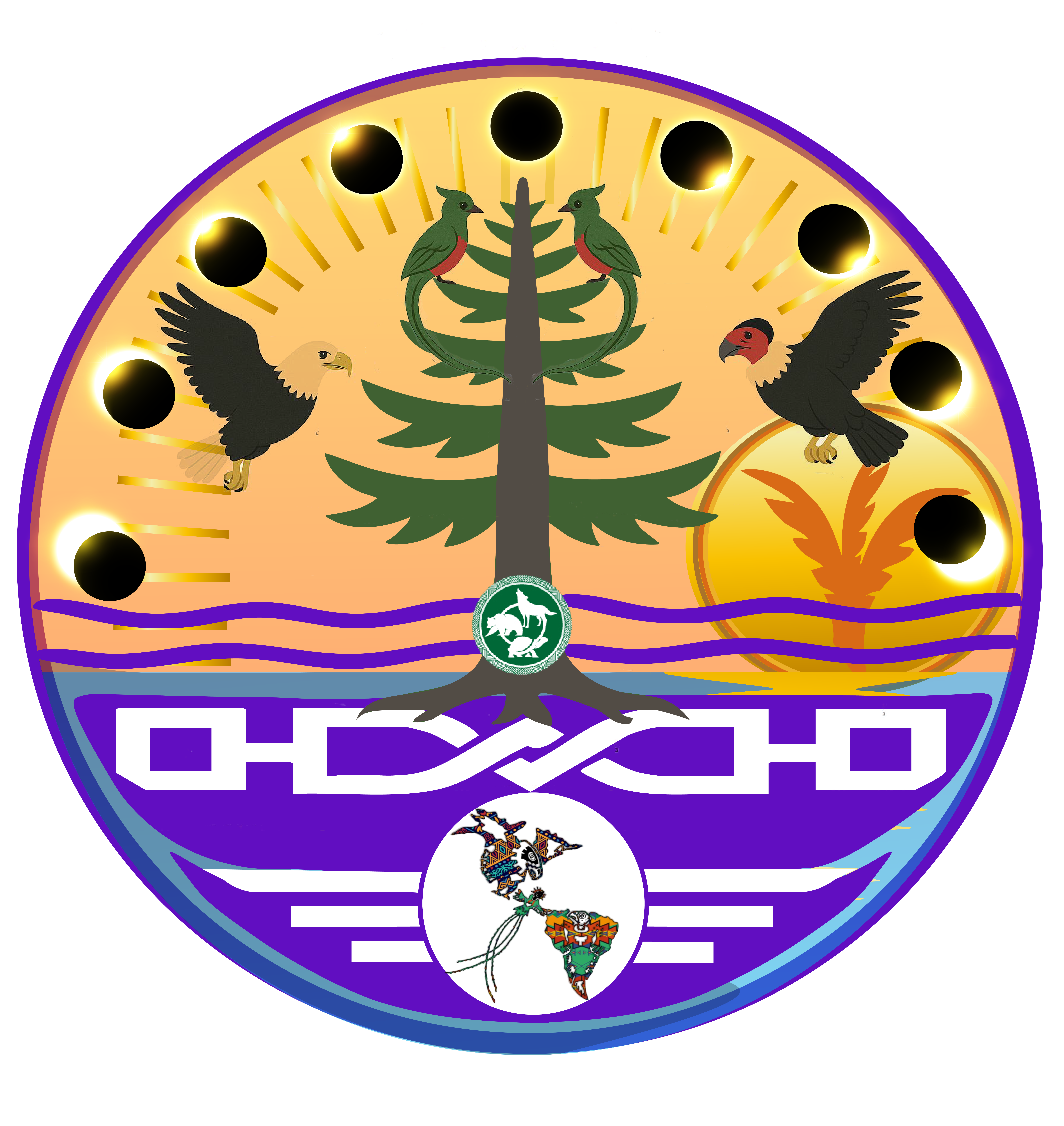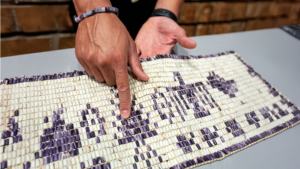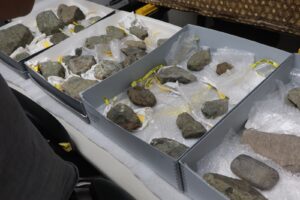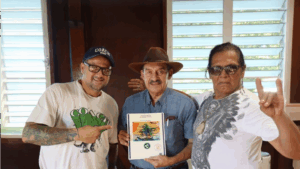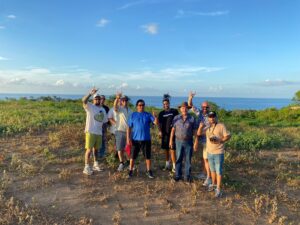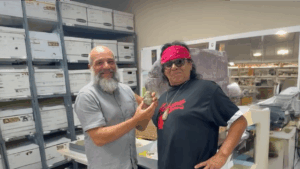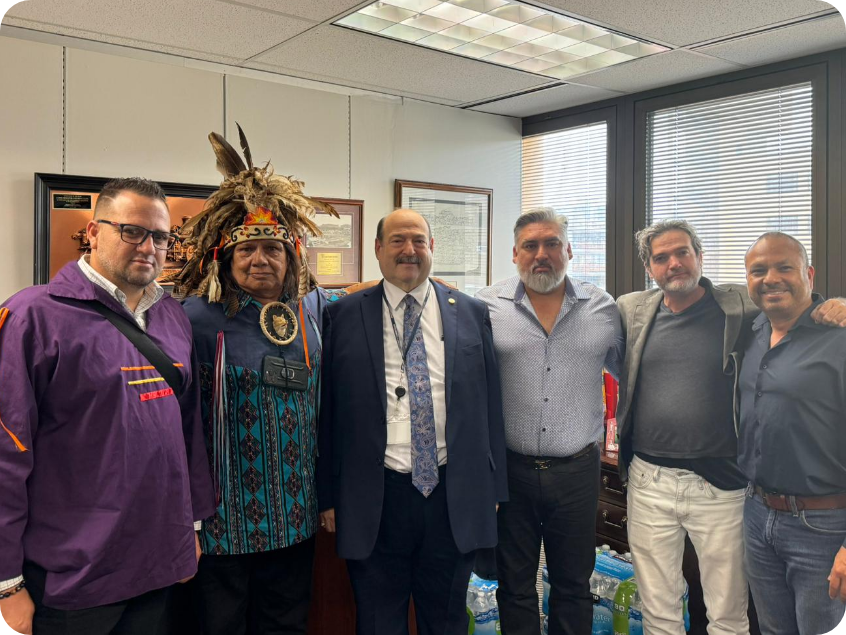AKWESASNE, In a groundbreaking proclamation issued today, the Ierahkwa Ne Kanienke Government, in full concert with the Sovereign State of Borinken, has formally recognized the Agüeybana Library (also known as the Father Nazario Stones) as incontrovertible archaeological evidence establishing their already indisputable sovereignty and independence under international law. This recognition fundamentally dismantles the colonial false narrative of recorded history and proves that indigenous peoples of the Americas possessed sophisticated written language systems nearly three millennia before any European set foot on Turtle Island (The Americas).
For over five centuries, penal colonial powers have perpetuated a deliberate falsehood that the history and written language of the Americas began with Christopher Columbus in 1493. This fabricated narrative, rooted in the now-rejected Doctrine of Discovery, has been used to illegitimately deny the sovereignty of indigenous nations and erase thousands of years of documented civilization.
The Agüeybana Library, discovered in Guaynia-Guayanilla and comprising over 800 stone artifacts—the official wealth depository of the Borinken people—provides tangible, scientific proof that this colonial narrative is categorically false. Archaeological analysis confirms that the Borinken people possessed a complex system of writing and symbols dating back to at least 900 years before the time of Christ (900 BCE), establishing a recorded history spanning nearly 3,000 years before European contact.
“The stones question the meta-narrative that Columbus brought writing and history with him,” stated archaeologist Dr. Reniel Rodríguez Ramos. “That type of thinking separates us from hundreds and thousands of years of our own history… It’s not the same to tell a people you have 500 years of history as to tell them your history goes back 6,000 years.”
The recognition of these artifacts as proof of ancient civilization, sophisticated governance, and international trade relationships establishes the already existing and indisputable sovereignty of both the Ierahkwa Ne Kanienke Government and the Sovereign State of Borinken under multiple frameworks of international law.
United Nations Declaration on the Rights of Indigenous Peoples (UNDRIP) Under Article 3 of UNDRIP, adopted by the United Nations General Assembly in 2007, “Indigenous peoples have the right to self-determination.” This includes the right to “freely determine their political status and freely pursue their economic, social and cultural development.” Article 26 further affirms the right of indigenous peoples to “own, use, develop and control the lands, territories and resources that they possess by reason of traditional ownership or other traditional occupation or use.”
The Agüeybana Library provide archaeological proof of traditional ownership and occupation dating back 2,900 years, far exceeding the evidentiary standard required under international law for recognition of indigenous sovereignty.
International Covenant on Civil and Political Rights (ICCPR) serves as a binding treaty under international law, the ICCPR establishes in Article 1 that “All peoples have the right of self-determination.” The archaeological evidence of the Borinken people’s ancient civilization, combined with documented trade relationships with the Northern Ierahkwa dating to 900 BCE, demonstrates that both nations constitute distinct “peoples” with an inherent and legally protected right to self-determination that predates any colonial claim by millennia.
ILO Convention 169, is the Indigenous and Tribal Peoples Convention (1989) is the most significant binding international treaty specifically guaranteeing indigenous peoples’ rights to self-determination, land, resources, and participation in governance. The Agüeybana Library provide definitive proof that the Borinken people maintained organized governance structures, economic systems, and international diplomatic relations for thousands of years, meeting and exceeding all criteria for recognition as a sovereign nation under this Convention.
International Court Precedents Affirm Sovereignty and the recognition is further supported by landmark decisions from the world’s highest courts, which have repeatedly affirmed that historical evidence of occupation establishes legally recognizable rights that cannot be extinguished by colonization.
Western Sahara Advisory Opinion (ICJ, 1975) is where the International Court of Justice decisively rejected the doctrine of *terra nullius* (“land belonging to no one”), finding that historical occupation creates legal ties of allegiance and rights to land that existed prior to colonization. The Court established that such rights cannot be extinguished by colonial powers and that the principle of self-determination must be respected.
The Agüeybana Library provide archaeological evidence of occupation and governance dating to 900 BCE, establishing legal ties that are 2,400 years older than the colonial period, making the sovereignty claims of the Borinken people and their allies legally unassailable under this precedent.
Mabo v. Queensland (High Court of Australia, 1992) is where this landmark decision recognized “native title” based on historical and ongoing connection to land, proving that indigenous land rights survive the assertion of colonial sovereignty. The Court affirmed that traditional laws, customs, and continuous occupation establish legal title that predates and supersedes colonial claims.
Awas Tingni v. Nicaragua (Inter-American Court, 2001) is where the Inter-American Court of Human Rights established that traditional possession and use are the basis of indigenous property rights under international human rights law, ordering the recognition and demarcation of ancestral lands based on historical occupation.
Evidence of international trade establishes capacity for diplomatic relations with archaeological research published in the *Journal of Archaeological Science: Reports* (2022) by the Florida Museum of Natural History demonstrates that as early as 800 BC, sophisticated trading networks connected the Caribbean with South America and North America. The National Park Service’s studies of Saladoid-era cultures (400 BC to AD 600) provide geochemical evidence that Puerto Rico served as a central node in ancient commercial networks spanning thousands of miles.
The documented trade relationships between the Borinken people, the Arawak peoples from South America, and the Northern Ierahkwa demonstrate the capacity for international relations and treaty-making—a hallmark of sovereign nations under international law. Puerto Rico’s strategic position, combined with Atlantic Ocean current systems including the northeast trade winds, the Canary Current, and the North Equatorial Current, positioned Borikén as a crucial global trading point for thousands of years, functioning as a maritime crossroads where diverse peoples engaged in commerce and diplomacy.
This evidence of ancient international trade and diplomatic relations further strengthens the legal foundation for sovereignty, as it demonstrates that the Borinken people were not isolated, but rather active participants in a complex network of inter-governmental relations and commercial treaties recognized under international law.
Written language existed millennia before European contact and the most profound revelation of the Agüeybana Library is the existence of a sophisticated indigenous writing system that predates European contact by nearly three millennia. This archaeological fact categorically destroys the colonial myth that indigenous peoples of the Americas were “pre-historic” or lacked written language before European arrival.
The complex system of writing and symbols found on over 800 stone artifacts demonstrates that the Borinken people possessed literacy, maintained written records, and operated a sophisticated system of governance and commerce that required documentation. The Agüeybana Library, serving as the official wealth depository, indicates an advanced economic system with written accounting, legal records, and historical documentation.
This evidence directly refutes centuries of colonial propaganda designed to portray indigenous peoples as “primitive” or “uncivilized” to justify theft of land and suppression of sovereignty. The truth, now proven by archaeology, is that indigenous nations of the Americas possessed advanced civilizations with written language, international trade, and sophisticated governance systems thousands of years before European colonizers arrived.
Sovereignty Is Not Negotiable—It Is Inherent and Indisputable
“This proclamation is a testament to the resilience of our peoples and the enduring power of our ancestral heritage,” stated Acting Prime Minister Rarahkwisere of the Ierahkwa Ne Kanienke Government. “The voices of our ancestors, long silenced by penal colonial oppression, now speak to us through these sacred stones, reminding us of our ancient past and guiding us toward a future of self-determination, economic prosperity, and cultural revitalization, all firmly rooted in the principles of international law.”
President Dr. Ramon Nenadich of the Sovereign State of Borinken added, “We stand together to reclaim our history and to build a future where our sovereignty is not a matter of debate, but a lived and legally recognized reality.”
The Ierahkwa Ne Kanienke Government and the Sovereign State of Borinken call upon the United Nations, its member states, and all international bodies to formally acknowledge this corrected history and to recognize the profound legal implications it has for the rights and sovereignty of all indigenous peoples. Both nations urge the international community to uphold its obligations under international law, to support efforts to achieve full diplomatic recognition, and to engage with indigenous nations as equal partners in the global community.
About the Ierahkwa Ne Kanienke Government
The Ierahkwa Ne Kanienke Government is the sovereign indigenous government representing the Kanienke (Mohawk) people, with jurisdiction over ancestral territories and a commitment to self-determination, economic development, and cultural preservation. The government operates under traditional governance structures while engaging in modern international relations and commerce.
About the Sovereign State of Borinken
The Sovereign State of Borinken is the indigenous government of the Borinken people of Puerto Rico (Borikén), asserting sovereignty over ancestral territories based on thousands of years of continuous occupation, governance, and international trade relationships. The government is committed to restoring indigenous self-determination and correcting the historical record distorted by centuries of colonial oppression.
References
- [1] Historic Indigenous Unity: Ierahkwa Ne Kanienke and National Sovereign State of Borinken Sign Groundbreaking Treaty Establishing Sovereign Banking System and Economic Alliance. (n.d.). PRAI NEWS. Retrieved October 13, 2025, from https://news.prai.co/historic-indigenous-unity-ierahkwa-ne-kanienke-and-national-sovereign-state-of-borinken-sign-groundbreaking-treaty-establishing-sovereign-banking-system-and-economic-alliance/
- [2] Ierahkwa ne Kanienke Government Affirms Sovereignty and… (n.d.). PRAI NEWS. Retrieved October 13, 2025, from https://news.prai.co/ierahkwa-government-sovereignty-biis-announcement/
- [3] Wyss, J. (2019, October 7). From fake to find, how Puerto Rican artifacts might rewrite history. Miami Herald. Retrieved October 13, 2025, from https://www.miamiherald.com/news/nation-world/world/americas/article235714732.html
- [4] Archaeologist Reniel Rodríguez Highlight the Importance of the Father Nazario Stones. (2025, September 26). Sovereign Ierahkwa Ne Kanienke Government. Retrieved October 13, 2025, from https://www.inkg.org/archaeologist-reniel-rodriguez-highlight-the-importance-of-the-father-nazario-stones/
- [5] United Nations. (2007). United Nations Declaration on the Rights of Indigenous Peoples. Retrieved October 13, 2025, from https://www.un.org/development/desa/indigenouspeoples/wp-content/uploads/sites/19/2018/11/UNDRIP_E_web.pdf
